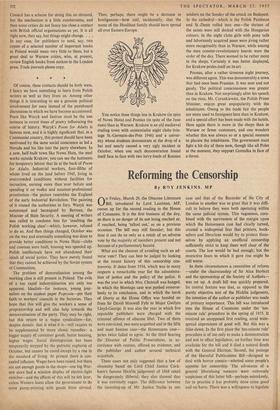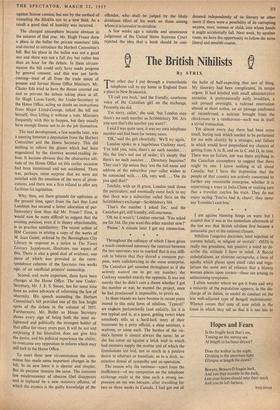Reforming the Censorship
By ROY JENKINS, MP ON Friday, March 29, the Obscene Literature Bill, introduced by Lord Lambton, MP, comes up for the second reading in the House of Commons. It is the first business of the day, so there is no danger of its not being reached or, if reached, being 'talked out,' as on a previous occasion. The bill may still founder; but this time it can do so only as a result of an adverse vote by the majority of members present and not because of a parliamentary hazard.
What are the chances of avoiding such an ad- verse vote? They can best be judged by looking at the recent history of this censorship con- troversy. It dates from 1954, which was in many respects a remarkable year for the administra- tion of justice and the policy of the police. It was the year in which Mrs. Christofi was hanged, in which the Montagu case was pushed remorse- lessly to its conclusion, and in which the torch of liberty at the Home Office was handed on from Sir David Maxwell Fyfe to Major Gwilym Lloyd-George. It was also the year in which five reputable publishers were charged with the criminal offence of obscene libel. Two of them were convicted, two were acquitted and in the fifth and most famous case—the Heinemann case— juries twice failed to agree. At the third hearing the Director of Public Prosecutions, in ac- cordance with custom, offered no evidence, and the publisher and author secured technical acquittals.
These cases not only suggested that a law of obscenity based on Lord Chief Justice Cock- burn's famous Hicklin judgement of 1868 could be dangerously illibetal; they also showed that it was extremely vague. The difference between the summing-up of Mr. Justice Stable in one case and that of the Recorder of the City of London in another was so great that it was diffi- cult to believe they were both operating within the same judicial system. This vagueness, com- bined with the narrowness of the margin upon which the Heinemann case had clearly turned, created a widespread fear that printers, book- sellers and librarians would try to protect them- selves by applying an unofficial censorship sufficiently strict to keep them well clear of the courts. The law would be bad enough; but the restrictive fears to which it gave rise might be still worse.
In these circumstances a committee of reform —under the chairmanship of Sir Alan Herbert and the sponsorship of the Society of Authors— was set up. A draft bill was quickly prepared. Its central feature was that, as opposed to the purely objective text of the Hicklin judgement, the intention of the author or publisher was made of primary importance. This bill was introduced into the House of Commons under the 'ten- minute rule' procedure in the spring of 1955. It received an unopposed first reading, amid wide- spread expressions of good will. But this was a false dawn. In the first place the 'ten-minute rule' procedure is of use only to make a demonstration and not to effect legislation; no further time was available for the bill and it died a natural death with the General Election. Second, the passage of the Harmful Publications Bill—designed to deal with horror comics—whetted some people's appetite for censorship. The advocates of a general liberalising measure were extremely suspicious of this latter bill—perhaps mistakenly, for in practice it has probably done some good and no harm. There was a willingness to legislate against horror comics, but not by the method of extending the Hicklin test to a new field. As a result a good deal of hostility was incurred.
The changed atmosphere became obvious in the autumn of that year. Mr. Hugh Fraser drew a place in the ballot for private members' bills and elected to introduce the Herbert Committee's bill. But his place in the ballot was not a good one and there was not a full day but rather less than an hour for the debate. In these circum- stances the bill could only have made progress by general consent; and this was not forth- coming—least of all from the trade union of present and former Home Office Ministers. Mr. Chuter Ede tried to have the House counted out and so prevent the debate taking place at all. Sir Hugh Lucas-Tooth, the Under-Secretary at the Home Office, acting no doubt on instructions from Major Lloyd-George, talked the bill out himself, thus killing it without a vote. Ministers frequently wish this to happen, but they usually have enough finesse not to do the job themselves.
The next development, a few months later, was a meeting between a deputation from the Herbert Committee and the Home Secretary. This did nothing to relieve the gloom which had been engendered by the abortive second-reading de- bate. It became obvious that the obstructive atti- tude of the Home Office on this earlier occasion had been intentional and not accidental. There was, perhaps, some surprise that we were not satisfied with the cessation of the wave of prose- cutions, and there was a firm refusal to offer any facilities for legislation.
Why, then, are there grounds for optimism at the present time, apart from the fact that Lord Lambton has secured a better allocation of par- liamentary time than did Mr. Fraser? First, it would now be more difficult to suggest that the existing position, even if in theory objectionable, is in practice satisfactory. The recent action of HM Customs in seizing a copy of the works of M. Jean Genet, ordered by the Birmingham City Library in response to a notice in The Times Literary Supplement, illustrates one aspect of this. There is also a good deal of evidence, one piece of which was provided in the corre- spondence columns of the Spectator two weeks ago, of an unofficial printers' censorship.
Second, and more important, there have been changes at the Home Office. The new Under- Secretary, Mr. J. E. S. Simon, has for some time been an active advocate of reforming the law of obscenity. His speech seconding the Herbert Committee's bill provided one of the few bright spots of the debate in the autumn of 1955. Furthermore, Mr. Butler as Home Secretary shows every sign of being both the most en- lightened and politically the strongest holder of that office for many years past. It will be sad and surprising if his liberalism does not give him the desire, and his political experience the ability, to overcome any opposition to reform which may still lurk in the Home Office.
To meet these new circumstances the com- mittee has made some important changes in the bill. In its new form it is shorter and simpler. But its purpose remains the same. The common law misdemeanour of obscene libel disappears and is replaced by a new statutory offence, of which the essence is the guilty knowledge of the offender, who shall be judged by the likely dominant effect of his work on those among whom it is intended to circulate.
A few weeks ago a notable and unanimous judgement of the United States Supreme Court rejected the idea that a book should be con- demned independently of its literary or other merit if there were a possibility of its corrupting anyone, man, woman or child, into whose hands it might accidentally fall. Next week, by another route, we have the opportunity to follow the same liberal and sensible course.



































 Previous page
Previous page